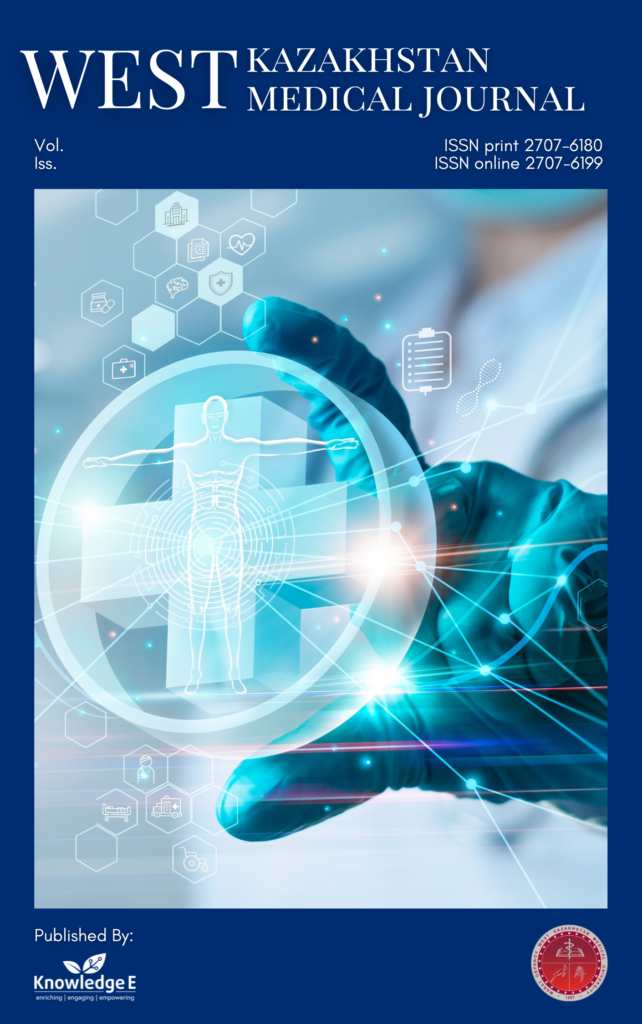
West Kazakhstan Medical Journal
ISSN: 2707-6180 (Print) 2707-6199 (Online)
Pioneering research advancing the frontiers of medical knowledge and healthcare practices.
Resynchronizing Implantable Cardioverter-Defibrillator (CRT-D) for Left Ventricular Dysfunction in Patients with Chronic Heart Failure
Published date: Dec 20 2024
Journal Title: West Kazakhstan Medical Journal
Issue title: West Kazakhstan Medical Journal: Volume 66 Issue 4
Pages: 433 - 442
Authors:
Abstract:
A cardiacresynchronization therapy defibrillator (CRT-D) corrects intracardiac mechanical dyssynchrony by pacing the right and left ventricles synchronized with the atrial rhythm. The CRT-D implantable cardioverter defibrillator is used in chronic heart failure (CHF) because patients with heart failure have a poor prognosis, with mortality rates averaging 15–60% per year. Implantable cardioverter defibrillator CRT-D improves the functional state of the heart and increases left ventricular systolic dysfunction.The purpose of the study wasto evaluate the effect of the implantable cardioverterdefibrillator CRT-D device on left ventricular function in patients with CHF.We selected patients with NYHA class III or IV heart failure, left ventricular ejection fraction (LVEF) less than 35%, and internal QRS complex duration of more than 150 ms for CRTD implantation among patients hospitalized in the cardiology department of Aktobe Medical Center (AMC) in Aktobe, Kazakhstan, from 2022 to 2023. Total 60 patients were monitored for 48 weeks with an assessment of left ventricular function after CRT-D implantation. At 48 weeks after implantation of the ventricular assist device, significant treatment outcomes were observed (p=0.001): physical tolerance increased from 268 m to 326 m within 6 minutes of the test and LV ejection fraction (EF,%) from 33 to 37% and decrease in QRSms duration from 154 to 128ms .Also, EDV/EDS (ml/cm) decreased from 249 to 160 mL/174 to 110cm. There was a correlation between EDS (cm) and 6MWD (m) levels (r=0.376; p=0.001). Thus, patients with CHF who were implanted with the CRT-D device showed improvement in left ventricular function.
Keywords: implantable cardioverter/defibrillator (CRT-D), chronic heart failure (CHF), LV dyssynchrony, left ventricular ejection fraction (LVEF), QRS duration
References:
[1] Ponikowski P, Voors AA, Anker SD, Bueno H, Cleland JG, Coats AJ et al. ESC guidelines for the diagnosis and treatment of acute and chronic heart failure. Eur J Heart Fail. 2016; 18:891–975. doi: 10.1093/eurheartj/ehw128.
[2] Johann Christoph Geller, Thorsten Lewalter, Niels EskeBruun,Milos Taborsky, Frank Bode and et.al. Implantbased multi-parameter telemonitoring of patients with heart failure and a defibrillator with vs. without cardiac resynchronization therapy option: A subanalysis of the IN-TIME trial. Clin. Res. Cardiol. 2019 Oct;108(10):1117-1127. Epub 2019 Mar 14. PMID: 30874886.PMCID: PMC6753058DOI: 10.1007/s00392-019-01447-5
[3] ESC Guidelines on cardiac pacing and cardiac resynchronization therapy. ESC Clinical Practice Guidelines, 29 Aug 2021 https://www.escardio.org/Guidelines/Clinical-Practice-Guidelines/Cardiac-Pacing-and- Cardiac-Resynchronization-Therapy
[4] Hana Cho, Andreas S. Barth, Gordon F. Tomaselli. Basic science of cardiac resynchronization therapy molecular and electrophysiological mechanisms. Circ. Arrhythm Electrophysiol. 2012 June 1; 5(3): 594–603. doi:10.1161/CIRCEP.111.962746
[5] Ibadete Bytyçi and Gani Bajraktari. Mortality in heart failure patients. Anatol J Cardiol. 2015 ; 15(1): 63–68.PMCID: PMC5336901. PMID: 25550250doi: 10.5152/akd.2014.5731
[6] 2023 HRS/APHRS/LAHRS guideline on cardiac physiologic pacing for the avoidance and mitigation of heart failure. https://www.hrsonline.org/guidance/clinical-resources/2023-hrsaphrslahrs-guideline-cardiac-physiologicpacing- avoidance-and-mitigation-heart-failure
[7] On approval of the rules for the provision of specialized, including high-tech medical care. Documents of the Ministry of Health of the Republic of Kazakhstan dated September 7, 2022 in the Ministry of Justice of the Republic of Kazakhstan dated September 8, 2022 No. 29474. In [Kazakh and Russian].https://online.zakon.kz/Document/?doc_id=39542545
[8] Heidenreich PA, Bozkurt B, Aguilar D, Allen LA, Byun JJ, Colvin MM, Deswal A, Drazner MH, Dunlay SM, Evers LR, Fang JC, Fedson SE, Fonarow GC, Hayek SS, Hernandez AF, Khazanie P, Kittleson MM, Lee CS, Link MS, Milano CA, Nnacheta LC, Sandhu AT, Stevenson LW, Vardeny O, Vest AR, Yancy CW. 2022 AHA/ACC/HFSA Guideline for the management of heart failure: A report of the American College of Cardiology/American Heart Association Joint Committee on Clinical Practice Guidelines. Circ. 2022 May 03;145(18):e895-e1032. [PubMed] doi: 10.1161/CIR.0000000000001063.
[9] Ziaeian B, Fonarow GC. Epidemiology and aetiology of heart failure. Nat. Rev. Cardiol. 2016 Jun;13(6):368-78. [PMC free article,PubMed].doi: 10.1038/nrcardio.2016.25.
[10] Connie W. Tsao, Chair, Aaron W. Aday, Zaid I. Almarzooq, Cheryl A.M. Anderson, Pankaj Arora, Review. Heart Disease and Stroke Statistics—2023 Update: A Report From the American Heart Association. Published 25 January 2023.Circ. Volume 147, Number 8. https://doi.org/10.1161/CIR.0000000000001123
[11] Johanna B. Tonko, Christopher Blauth, Eric Rosenthal, Christopher A. Rinaldi. Completely epicardial implantable cardioverter/defibrillator (ICD) and CRT-Dsystems: A case and systematic literature review. Pacing Clin. Electrophysiol. 2021; 44:1616–1630.DOI:10.1111/pace.14318.
[12] Kamala P. Tamirisa, Sana M. Al-Khatib. Sex differences in sustained ventricular arrhythmias. A continuing dialogue. Jacc: Clin. Electrophysiology. 2022; 8(12): https://doi.org/10.1016/j.jacep.2022.11.009
[13] L. Castro, S. Pecha, M. Linder, J. Vogler, N. Gosau, C. Meyer, S. Willems, H. Reichenspurner and S. Hakmi. The wearable cardioverter defibrillator as a bridge to reimplantation in patients with ICD or CRT-D-related infections. Castro et al. J. Cardiothorac. Surg. 2017; 12:99 DOI 10.1186/s13019-017-0669-2
[14] Chi Keong Ching, Yu-Cheng Hsieh, Yen-Bing Liu et al. The mortality analysis of primary prevention patients receiving a cardiac resynchronization defibrillator (CRT-D) or implantable cardioverter-defibrillator (ICD) according to guideline indications in the improved SCA study. Original Article. First published: 02 July 2021https://doi.org/10.1111/jce.15149
[15] Shu Zhang, Chi-Keong Ching, Dejia Huang, Yen-Bin Liu, Diego A, Rodriguez-Guerrero et al. Utilization of implantable cardioverter-defibrillators for the the prevention of sudden cardiac death in emerging countries: Improve SCA clinical trial. Heart Rhythm, Volume 17, Issue 3, March 2020, Pages 468-475 https://doi.org/10.1016/j.hrthm.2019.09.023
[16] Maurizio Gasparini1, Seah Nisam. Implantable cardioverter defibrillator harm? Euro pace (2012) 14, 1087–1093 doi:10.1093/europace/eus025
[17] Dichtl W, Wolber T, Paoli U, Brüllmann S, Stühlinger M, Berger T et al. Appropriate therapy but not inappropriate shocks predict survival in implantable cardioverter defibrillator patients. ClinCardiol2011;34:433–6. PMID: 21678454. PMCID: PMC6652665. DOI: 10.1002/clc.20910
[18] Guido H. van Welsenes, Johannes B. van Rees, C. Jan Willem Borleffs, Suzanne C. Cannegieter, Jeroen J. Bax, Lieselot van Erven, and Martin J. Schalij. -term follow-up of primary and secondary prevention implantable cardioverter defibrillator patients. Europace (2011) 13, 389–394 doi:10.1093/europace/euq494